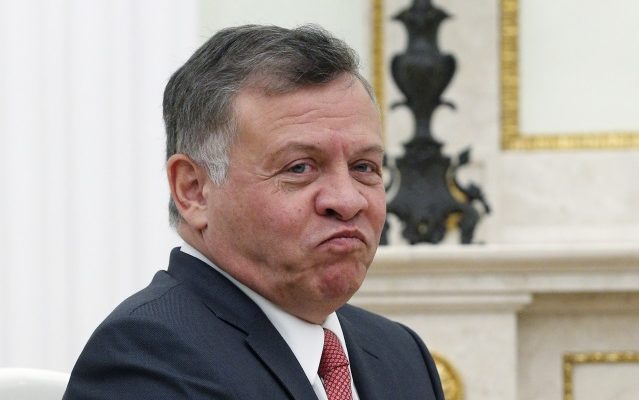The throne of King Abdullah II is being threatened by the largest protests Jordan has seen in years
By: AP
Thousands of Jordanians protested against a planned tax increase for the fourth straight day Sunday, marching toward the office of the prime minister and demanding his resignation.
King Abdullah II asked Prime Minister Hani Mulki to report to the royal palace Monday, after which Mulki resigned.
Some reports say up to 200,000 people participated in demonstrations against the tax plan, filling the streets across Jordan in recent days in the largest anti-government protests in several years. In some areas, protesters burned tires and clashed with police.
Western allies of the kingdom view any signs of social unrest with concern. Jordan is seen as an island of relative stability in a turbulent region and plays a key role in the international fight against Islamic terrorism.
‘Game over, government of thieves’
In the Jordanian capital of Amman, protesters marched toward Mulki’s downtown office Sunday, scuffling with riot police who tried to keep them back.
“Game over, government of thieves,” the crowd chanted. Others shouted, “The Jordanian citizen is not an ATM machine.”
Jordan’s government is under pressure from the International Monetary Fund (IMF) to carry out economic reforms and austerity measures to get growing public debt under control. The pro-Western kingdom has experienced an economic downturn, coupled with rising unemployment, in part because of prolonged conflict in neighboring Syria and Iraq and a large influx of refugees several years ago.
Many Jordanians feel they are being squeezed financially by a government they perceive as corrupt, saying they are not getting services for the taxes they are asked to pay. The planned tax rise was preceded by a series of price increases, most recently for fuel.
Protest organizers urged the king to cancel the tax plan, saying the poor are being targeted disproportionately. More than a dozen unions and professional associations with a half million members are planning a one-day strike for Wednesday to press those demands.
“The government dealt with the people, who are going through severe economic hardship, as the main source of revenues and didn’t think of other sources like improving the economy, such as creating jobs and attracting investors,” said analyst Nidal Mansour.
Jordan’s king has the final say in all policy matters, but he positions himself as being above the political fray. He frequently reshuffles or disbands governments as a way of defusing public anger.
Earlier this week, he suspended a fuel price increase during the Muslim fasting month of Ramadan, which ends in mid-June. He was also quoted as saying that ordinary Jordanians cannot be expected to bear the entire burden of economic reforms.





